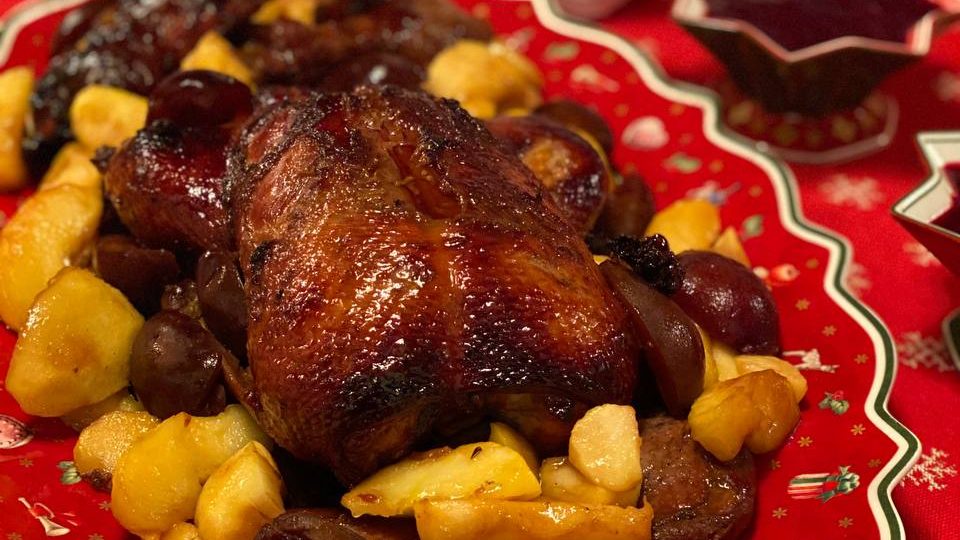For whatever reason, I find ducks objectively festive. If I were to see a duck, buttocks plump, waddling around Blackheath wearing a Santa hat, I wouldn’t be surprised.
It’s probably because duck takes on Christmassy spice so well. The meat was made for the waft of orange and the intense hit of cloves and cinnamon. Duck is gamey, fiercely seasonal by design, and although turkey and ham will always take pride of place on my Christmas table, the more diminutive birds are more than welcome to snugly rest either side of December 25, safely in the trappings of the 12 days.
The Ukrainian chef Yurii Kovryzhenko feels much the same. If anything, he is even more geared up for duck during the holidays. He told me the meat is revered in Ukraine year-round, but it is particularly suited to winter.
In February this year, Kovryzhenko arrived in London in his capacity as Ukraine’s official ambassador for Ukrainian cuisine. Before Russia’s illegal invasion of the country, he operated top restaurants in Kyiv, and travelled the world regularly promoting Eastern European food such as potato dumplings, borscht, and cabbage stuffed with pork.
His arrival at the Ukrainian Embassy in London was extended considerably following the outbreak of war. For more than a month, he and his partner Olga Tsybytovska were unable to return home. At the time, I met them for a pint of Guinness and all was sadness and uncertainty. They soon decided to stay in London, clear in the view that they are better placed raising money for Ukraine in the UK by way of supper clubs and campaigning. The couple have worked with the likes of Jamie Oliver, Jason Atherton and Angela Hartnett to raise hundreds of thousands of pounds for the Ukrainian fight.
In July, Kovryzhenko and Tsybytovska managed to open their first restaurant in the UK: Mriya, which loosely translates as “dream”.
Kovryzhenko told me: “Mriya means dream in Ukrainian, and we as a nation are dreaming of victory, and the opportunity to host people again. We want to share our culture.
“Historically, Ukrainians are real dreamers. In that sense the restaurant is exciting, because it’s the start of a story, the realisation of a dream. The Russians can destroy our homes, but not our dreams.”
The restaurant, in Chelsea, he says, works as a sort of “cultural embassy”.
Food, for Kovryzhenko, is “diplomacy” and a “powerful weapon to incite change”, and Mriya is as much an exhibition space for Ukraine as it is somewhere to eat golubtsi (cabbage rolls), or kabachkovi oladky (stuffed courgette pancakes).
Mriya goes even further: it is staffed by Ukrainian refugees. Some worked
in hospitality back home, others worked in other industries – all needed work, and many were unable to transfer their skills to the UK market. The restaurant is a refuge and a place to start a new life, even if temporary. This connection is powerful and, at Christmas, perhaps more vital than ever.
And so I urge you to visit the restaurant, which does a magnificent Sunday roast. There will likely be duck available. Its skin will be wonderfully crisp. But if you’re unable to get to London before Christmas, try Kovryzhenko’s version for the home.
CHRISTMAS DUCK
INGREDIENTS:
1 duck
2 oranges
5 cinnamon sticks
15 cloves
10 star anise
10 allspice
100g honey
150g soy sauce
4 apples
30g brown sugar
100g butter
100g salt
METHOD:
Heat an oven to 160C. Cut each apple into eight pieces. Heat butter in a pan,
add sugar, and when the mass starts to boil, add the apple pieces to it – they
should caramelise. Put in a baking tin or tray and bake for 50 mins. Wash and dry the duck. Scorch off any excess feathers.
Half fill a large pot with water. Add all the spices and salt. Boil for a few minutes. You will get a kind of salt water “mulled wine”. Place the duck in this water and simmer for 20-30 minutes. Take out, and dry with paper towels.
Now throw the oranges into the water, turn up the heat and boil them for a few minutes – this is necessary so that the skin gets rid of its bitterness. Take out the oranges, cut them into four parts and stuff the duck with
them.
When the apples are ready, take out of the oven and set aside. Turn the oven up to 180C. Bake the stuffed duck in the oven for 1.5 hours. While the duck is cooking, make the glaze by combining the honey and soy sauce and boiling for five minutes.
Half an hour before the duck is ready, take it out of the oven and cover it with glaze. Shortly before serving, return the baked apples to the oven to warm though or warm in a pan if your oven space is limited.
Serve the duck with the baked apples. Alternatively, you could also serve with a sauce made by mixing blackcurrant jam with red wine, adding rosemary and thyme for more flavour.




